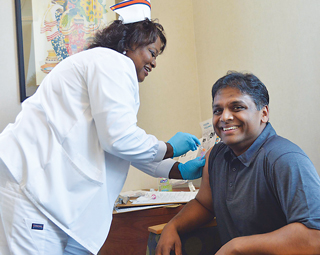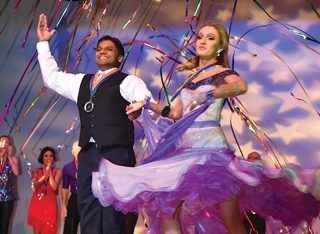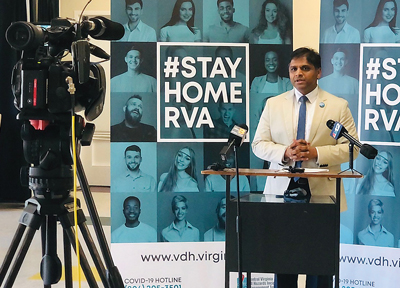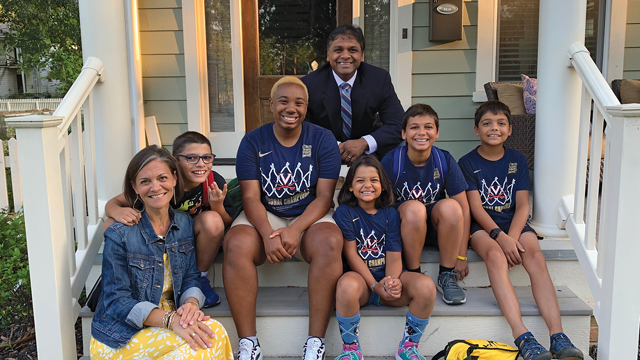During a pandemic or a public health crisis, families look to healthcare experts and scientists for guidance. Leaders rise up because of their courage, intelligence, and calm demeanor. Leaders like Danny Avula, the Richmond and Henrico Health Department director.
Since early March, Avula has quickly become a household name and a recognizable figure in the wake of COVID-19. Always a voice of reason, he is front and center during local coverage in the media, delivering essential information in a reassuring tone. His down-to-earth personality makes him approachable and accessible. And that comes across during his press briefings.
“Danny genuinely cares about people,” says his longtime friend Corey Widmer, lead pastor for Third Church in Henrico. “People really trust him. When he talks, he feels like a guy you could hang out with in your living room.”
A pediatrician and the father of five, Avula is a leader who delves into and analyzes data and then looks at the big picture, searching for elements that contribute to the health and wellness of communities.
He is a magnetic and inspirational leader “who has a deep passion for community renewal and justice and equity,” Widmer adds. “What makes him such a powerful leader is the way he gets people to rally around his vision… not through force or aggression or policy, but rather through inspiration and positivity.”

Protecting Public Health
Preventing disease and promoting health is the driving mission of the health department that Avula oversees. “The ethos of the job is to think about the questions: What are the root causes of disease? and How do we create an environment that increases health?” he says.
The job is multi-faceted and that’s a scenario that Avula appreciates. On the infectious disease side, the department monitors disease data and responds to cases of reportable diseases. “We have to figure out where the source of infection comes from and whether anybody else was exposed,” he says.
In its everyday duties, the Health Department has an enforcement responsibility. It permits all restaurants as well as well and septic systems. “Our staff is in restaurants every day ensuring that food is kept and stored at the right temperatures and that food-borne disease is prevented,” Avula says. “We also look at larger-scale health issues such as rates of infant mortality and premature birth. We look at the things that have to change, such as making sure that women have access to prenatal care.”
Teams work on everything from distributing curriculum around bullying prevention and smart hygiene to ensuring food access and wellness screening visits for refugee families.
“Part of the fun of the job is that our team does so many different things,” says Avula. “We do have a robust infrastructure for seeing patients as well. Our goal is not only to treat the individual patient, but also the people they have been exposed to. Tracing back is the best shot we have at containing the spread of disease.”
In his role as director, Avula helps create healthy opportunities for all residents in his jurisdiction. That responsibility requires flexing different muscles than his role of pediatrician, he says. “When I’m wearing my pediatric hat, I’m working with each individual patient. In public health, my patient is the city and county.”
There are many reasons why Avula is so effective in his job. He’s a “natural born connector. He connects people,” says his longtime friend Romesh Wijesooriya, MD, division chair of General Pediatrics and assistant professor of General Pediatrics, Children’s Hospital of Richmond at Virginia Commonwealth University. “He’s very systematic in his thinking. He can very quickly take a lot of variables in issues, process them and come up with a systematic way to approach the issue. I’ve seen that with his response to COVID-19.”

Leading a Frontline Defense
Since the start of the pandemic, a large percentage of Avula’s team has focused on the response to the spread of COVID-19. “That has taken over everything,” he says. “Most of our staff is really engaged in day-to-day response.”
His team handles approximately three large-scale testing events every week. The call center for COVID-19 fields up to 500 calls a day. Staff members work on case investigation and contact tracing, and four epidemiologists on staff go into long-term care facilities during outbreaks to help leadership and provide ongoing support and relief.
“We have another team that does data tracking on testing. We need to keep quality data so we have an accurate sense of what is going on,” Avula says. “We’ve had to train up other nurses and staff to provide that support to long-term care.”
His biggest challenge: This pandemic is far-reaching and it’s constantly changing. “We’ve never lived through anything with the sheer amount of impact in every arena of our lives,” he says. “It takes an extraordinary amount of coordination with other agencies, organizations, and the private sector.”
Because there are so many different facets of a pandemic that is both a health and economic crisis, Avula’s team has had to build new expertise. “My biggest challenge is also my biggest joy, watching my team work so effectively and constantly pivot. It’s amazing to watch,” he says. “Without a doubt, COVID-19 has been the most intense team-building exercise we have ever done. It’s been remarkable to see people from both our organization and our external partners rally around this together. It’s an extreme example of the work that the Health Department is doing every day that leads to lives being saved.”
Avula is doing an “amazing job with the COVID-19 outbreak,” says Sheryl Garland, chief of health impact for VCU Health System. “For a lot of people, it could be overwhelming, but he is calm. It’s been impressive to watch him interpret the data and help the general public understand the magnitude.”
Avula is wise beyond his years, she adds. “He thinks about all the aspects of issues as well as what partners need to be around the table. He builds off of what is learned through history and tries to come up with fair and equitable solutions that are in the interest of the people he is trying to serve.”

Ongoing Commitment to Community
Avula’s staff hears him talk about race and poverty regularly because there is “hardly a bigger driver of poor health than income. It’s stressful to be poor. You have unstable housing. You don’t have a stable job. You have disintegration of families and the impact of that,” he says.
Avula wrestles with the question “How do we change that and provide a safety net around low-income communities?” The Health Department is a solid resource for care, but many people in lower-income neighborhoods don’t have the privilege of seeking preventative care, he says. “Low-income individuals are diagnosed later because they don’t have a primary care doctor. You can catch disease earlier when you have regular access to a healthcare provider.”
While taking care of the health of low-income communities is an issue that health departments everywhere struggle with day to day, it’s also an issue that Avula has been actively engaged in for decades.
When Avula, his wife, Mary Kay, and his close friends were undergraduates at University of Virginia, Mary Kay and several of his friends went with a group of students to Mississippi during spring break to work with Civil Rights leader John Perkins in an effort to build bridges between black and white communities.
Avula wasn’t able to go with the group because he was teaching SAT classes, but he was always part of their shared commitment to racial healing, a mission the group of post-graduates remained committed to after college.
Racial healing embraces the belief that if you are trying to improve something, you have to put yourself in the middle and “learn from the inside,” Wijesooriya says. “That knowledge and experience is most powerful.”
After Avula and his wife moved to Church Hill when he started his residency at VCU School of Medicine, several of his UVA friends also moved to Church Hill, including Widmer, Wijesooriya, and Matt Illian.
Avula and his friends have since been committed to an inclusive Church Hill neighborhood, which includes different races, cultures, and income levels. “For the last sixteen years, we have all raised our families together and been involved in community development work,” he says. “We’ve been invested in our [public] schools. All of our kids have gone there.”
His devotion to Richmond and racial healing is all part of the journey.
“The way I think about my role for public health is informed by our lived experience,” he says. “The relationships I have in the community have changed the way I do my job.”
As Wijesooriya says, “Danny lives in the heart of the city and is engaged with a population that needs a voice the most, and I think it has made him better at his job because of that choice.”

Doctor for All
Born in 1979, Avula’s family spent the first eight years of his life in California and Philadelphia. During late elementary school, his family moved to Northern Virginia.
“My dad grew up in a tiny village in India and came over to the U.S. at the age of nineteen as an immigrant and then joined the Navy,” he says. “Both my parents worked for the Department of Defense.”
Avula has vivid memories from his middle school years of wanting to become a doctor. “My parents were very savvy about exposing me and encouraging me to head in that direction,” he says, adding that his brother is also a doctor.
For his seventh-grade science project, he found some urine test strips at the grocery store and remembers going door-to-door in his neighborhood asking people for urine samples. “And I got at least fifteen,” he laughs.
Growing up, he was always motivated by relationships and being connected in the community. Avula envisioned becoming a general practitioner and helping people in all stages of their lives; being part of the community. “Now, it’s a rare circumstance to have that kind of longevity and connection to a community,” he says. “Medicine is so specialized.”
Toward the end of high school and through college, he grappled with issues of race and income. When he attended VCU School of Medicine, he worked with low-income patients and began to understand that he couldn’t change their circumstances. “I started feeling a sense of helplessness,” he says. “I was working with patients who were obese and trying to have them commit to a new exercise regimen and to eat properly. But they were struggling to make ends meet, just trying to survive.”
During his third year of medical school, he realized he was on the wrong path. “I felt like I was in crisis,” he says. “I was uncertain as to what I wanted to do.”
He completed several rotations during school that included spending a month in Kenya and a month at Bon Secours working with grant money to control asthma. It was here that he was exposed broadly to different elements of public health. And then, he spent one of his last rotations at the Virginia Department of Health and something clicked. “I felt like this was what I wanted to do,” he says.
After completing a master’s in public health and a second residency in preventative medicine and public health at Johns Hopkins University, Avula started with the Richmond City Health Department as deputy director in 2009. He took over as director in 2016 and two years later, Avula assumed responsibility as director of the Henrico Health Department.
“Danny is one of the most poised people I know. He’s really unflappable. Even in the toughest of circumstances, he has a sense of calm,” says JR Hipple, managing partner of SIR, a strategy, communications, and market research firm and also a close friend of Avula’s. “He’s a brilliant guy; a rare person and leader.”
Avula additionally moonlights as a pediatric hospitalist at Chippenham Hospital. “I wanted to maintain some connection to clinical medicine,” he says. “I do that so I can stay connected and keep my skills up. It gives me a different lens and has really helped my perspective as a public health doctor.”
He loves being around and interacting with people from all walks of life – a personality trait that lends itself to working with the public. “We teased him when we were in college because he never did any work. He was super smart. He spent all of his time hanging out with people. I’ve hardly ever met another person as extroverted,” says Widmer.
Avula is also a fan of adventure, Widmer adds. “He’s the kind of guy that if you called him and said, ‘Do you want to drive to the Grand Canyon to see the sunrise?’ he would say let’s do it. He loves anything new and exciting.”
Perhaps it was that love of the unknown that inspired Avula to compete in and win Dancing with the Richmond Stars in 2017, hosted by the VCU Medical Center Auxiliary.
“I’m not a dancer at all,” Avula says with a laugh. “It was a good example of spending time and energy to learn a new skill and to get on stage. It was all for a good cause.”
At Home with Danny
Avula and his family are co-quarantining in Church Hill with Wijesooriya and his family. “They feel like family,” Avula says. “That has sustained our kids and both wives during the pandemic.”
Avula and Mary Kay, who married in 2001, have five children – two girls and three boys, Luke, Kiran, Abby, David, and Arjanaê, a 19-year-old who, Avula says, “adopted the family about two years ago.”
Avula and his family were renovating their home when the teen showed up on their doorstep, asking to see the house because she had been watching it being built. Over the years, she had moved around in public housing and during her last year in high school, Arjanaê told the Avulas that her situation was unstable.
“She felt like she was part of our family,” he says. “She went through a legal name change. It’s not a traditional adoption; she just morphed into the family. She has a beautiful relationship with the kids, which is my favorite part.”
She has also spent countless hours in the classroom with Mary Kay who teaches kindergarten at Chimborazo Elementary School. Avula says Arjanaê wants to be a teacher.
The Avula kids have a pretty regimented day, according to their father. “We have a family run every morning. Then they have blocks of classes. They have stayed engaged with education,” he says about life during the pandemic. “All told, we are blessed in many ways. Our kids spend a ton of time in the yard playing.” He adds that they have gotten in on the TikTok craze over the past months. “They have a whole string of videos,” he says. “They’ve done some creative ones.”
Like many of us, Avula has been working from home during the pandemic. “My 14-to 16-hour days are happening in my home office,” he says. “Three times a week, I do press and go to testing events. I try to circulate around the office to say hi to the people that have to be there. In other words, I am trying to practice what we preach and limit my interactions.”
Ask Avula what he loves most about his job, and he’ll say it’s the opportunity to work with different partners to address problems and create solutions. “Figuring out how to keep people healthy is a complicated puzzle. While this season has been intense, it’s been incredibly rewarding as well,” he says. “I’ve absolutely loved these past years in public health. I just love this job.”
Read Dr. Danny’s expert advice on whether you should have your kids ages five to eleven vaccinated against COVID-19 in Well Family here.
Photos: Fernando Rodriguez




